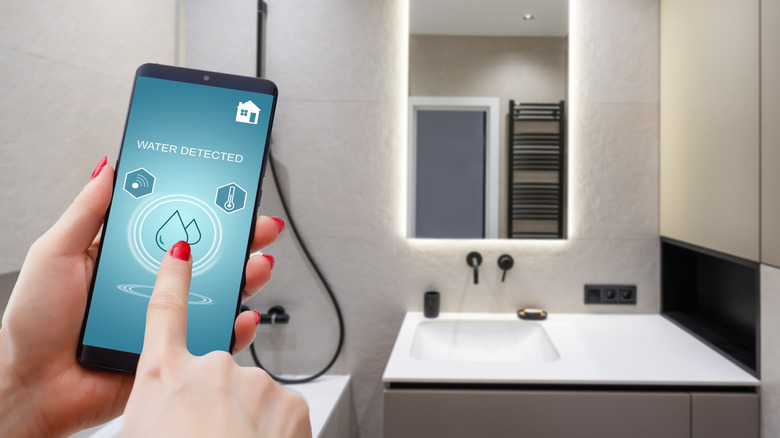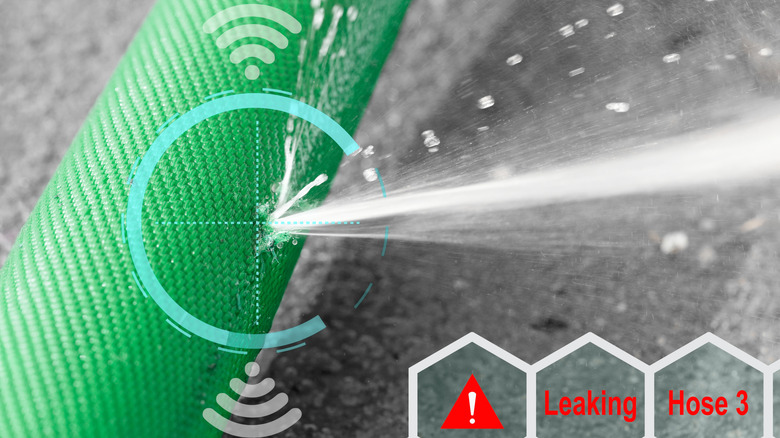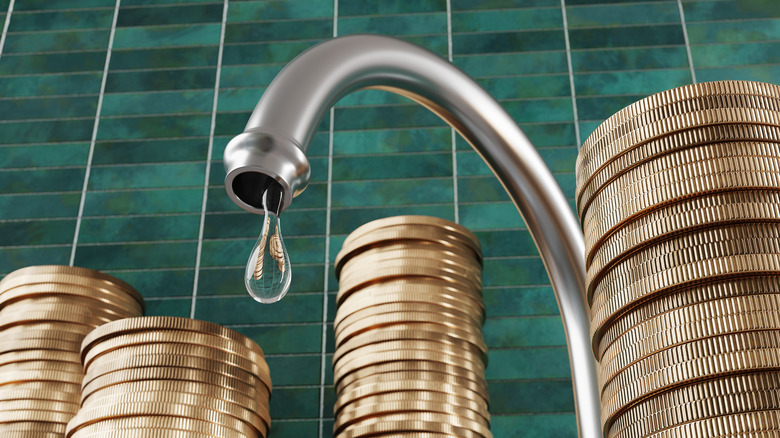All The Ways You Can Use Water Leak Sensors In Your Home
The vital key to protecting your home from damage, both simple and drastic, is proper preparation. When you prepare your home for certain eventualities, you'll be able to catch these hazards in the act and ensure that any damage they cause is kept to the absolute minimum. A good means of preparation is attaching various forms of sensors around your home to feed you information and alerts, such as sensors on your doors or windows, or water leak sensors near sources and users of water.
As the name implies, the primary purpose of a water leak sensor is to detect when water is flowing where it shouldn't be, such as outside of a pipe or underneath a water-using appliance like a washing machine. It's definitely vital to catch leaks early, as that's what will ensure your home isn't subject to potentially disastrous water damage. However, there are other benefits to placing a few leak sensors around your house. They'll help you detect other hazards and contaminants like burgeoning mold. They can help you to conserve water that might otherwise go to waste, and they can be strategically placed to protect your belongings. All of this, naturally, will help you save some money down the line.
Catch leaks and mold in the act
The water leak sensor is primarily meant to keep a watchful eye out for water leaks. It can be installed in a few different ways, such as within your actual water pipes, on a water control valve, or freestanding anywhere in your home. Sensors built into the water line monitor the water flow and sound an alarm if the flow becomes irregular, indicating a potential leak, and also shut down the flow depending on the model. A standing leak sensor or flood sensor uses physical probes that sound an alarm if those probes become wet from an accumulating puddle.
With a leak sensor attached to your water lines, you'll swiftly know if and when there is a leak somewhere in your home's system. The sensor may not be able to tell you precisely where the leak is, but just knowing one is present will allow you to shut off the water and call a plumber before it gets worse. Catching leaks early will ensure your floors and furniture aren't subject to water damage, as well as save you from hazards like wet electric outlets.
Additionally, if you place a standing leak sensor in the dark areas of your bathroom, kitchen, or basement, you'll be able to detect even small amounts of accumulating water that may not trigger a water line sensor. Having a sensor in these particular spots will help you catch the kind of soggy, muggy conditions that could potentially foster mold growth. Once mold takes root, it can be very annoying to get rid of, so it's definitely in your best interest to detect its ideal conditions and address them before it can set up shop.
Save money, conserve water, protect your belongings
Besides the main benefits of leak sensors in catching leaks and mold conditions, there are a few smaller perks to placing sensors on your water line and around your home. For instance, even if a leak is minimal and not in a spot where it can cause damage or foster mold, that's still water being wasted. According to the EPA, the average U.S. household wastes around 180 gallons of water per week due to various leaks. That's water that could be put to use properly elsewhere in your home, such as washing clothes or dishes, cooking, or just drinking it. A strategically placed leak sensor can let you know when there's water getting wasted in your home, helping you to catch it, fix it, and get that water back to where it's supposed to be.
Additionally, a leak sensor can serve as a vital line of defense for your valuable possessions, like prized collectibles or older family heirlooms. Either direct water exposure or increased ambient moisture could result in irreparable damage to these kinds of possessions, especially older, more fragile ones. If there's something in particular you want to give maximum protection, consider installing a leak or flood sensor nearby so you'll immediately know when water is encroaching.
Both of these perks have the cumulative benefit of saving you a stack of cash in the long run. Strategic placement of leak and flood sensors will help you prevent damage and mold, which can be costly to remedy, conserve water, thereby reducing your water bill, and protect possessions that would be prohibitively expensive to replace or repair.


